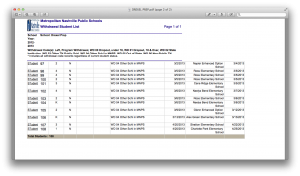We had the distinct pleasure of interviewing Rep. Joe Pitts for the Tennessee Education Report. He is a member of the House Education Committee and the House Education Subcommittee. He is a vocal voice in both committees. We thank him for taking the time to answer our questions.
Let’s start with Vouchers:
What impact will vouchers have on local school districts in terms of budget and tax burden?
A: Vouchers will have an immediate impact on local government’s budgets and the potential impact on local property tax is significant. The voucher will further dilute public education funding currently going to the local school district which has an extensive infrastructure – buildings, supervisory staff, transportation, etc. that supports ALL students residing in their jurisdiction. It is a delicate balance of funds that can be turned upside down if a sudden shift in funding policy, like vouchers, is made.
Do you believe that even if a limited voucher plan passes, the ultimate goal is statewide vouchers with broad qualifications?
A: If the past is prologue to the future, then one only need to look at the Charter school authorization passed many years ago by the General Assembly. The original concept was to address at-risk students in schools within specific geographic boundaries, and we even had a limit on the number of charter schools within those communities. Now, despite evidence to the contrary, Charter schools are available statewide for every student regardless of academic need. While Charter schools certainly have their place, given the right circumstances, it should be a tool at the LEA’s disposal.
An amendment recently passed to make private schools provide school lunches to those who come to the school via vouchers. Does that help your concern about students choosing free lunch or a private school?
A: Requiring a school participating in the voucher program to offer a school lunch program makes a flawed proposal less objectionable but still not one I can support. We don’t need a voucher program for at-risk students in failing schools. Currently if a student is in a failing school, the parents can raise their hand and request their student go to another, non-failing school, in the same district without sacrificing basic human needs like breakfast and lunch, and transportation, and special needs students get access to the services they need.
Why do you think the GOP is focused on vouchers/charters instead of fully-funding BEP 2.0?
A: Take a look around the country. Vouchers seem to be the “cause de jour.” It appears our education system is the last bastion of public funded services that haven’t been co-opted by the for-profit sector; sadly, not anymore.
Finally, do you think there will be transition problems when taking a child out of a public school and placing them in a private school? Do you think the child may fall behind from the start?
A: When the child moves from one public school to another public school, or in this case, a private school, it will present some challenges. Children are resilient though, but I am concerned about the moving back and forth between and among systems since not all private school curriculum lines up with the public school system.
Let’s more on to charters.
Do you believe the recent charter authorizer bill is taking away local control from local education boards?
A: Yes. Sadly, as amended, the bill would establish a non-elected group of people appointed by both Speakers and the Governor, to decide how and how much local tax money could be obligated for a state authorized charter school. That’s like the state deciding how big your police force should be and sending you the bill. This is just plain wrong.
Are you supportive of charter schools that get local approval or would you rather limit how many charter schools can open in the state?
A: I do believe charter schools are a good option for LEA’s who need to try something different for students with specific academic needs. Being a member of a local school board is a difficult task. You are required and responsible for the academic achievement of all students in your district but have no say in the funding allocated by any of the funding entities. I am not a fan of establishing limits on schools if the LEA has control of the authorization.
General Education Questions
If you were the commissioner of education, what would be the first thing you would do to improve public education in Tennessee?
A: Three things simultaneously: I would implore the Governor to make it our policy that no new changes would be sought or implemented for two years or until we can sort out the changes enacted in the last two years.
Next I would meet with the school directors and school boards, individually, of every district with a failing school and let them know we are going to become partners. Instead of a shotgun marriage, it would be a partnership based on putting our resources where are mouths are and helping the failing schools first and immediately. Students struggling in schools are very often victims of their home environment. I would deploy an intervention team consisting of master level social workers, health professionals and academic coaches to these schools immediately to provide intensive work and support.
Lastly, I would work with the Charter schools to create a bold new platform for turning around these schools in our districts not meeting expectations. We need to look beyond the numbers and think about year round charter schools, extended hours, or other non-traditional means to address the needs of the students and their families. A charter school that mirrors a traditional public school hardly seems worth the effort.
I am convinced that the overwhelming majority of our LEA’s are performing at a high level, given the meager resources we allocate to them, and are open to our help, be it public or private, to give our students the best education experience possible.
Certain reform groups like Democrats for Education Reform and StudentsFirst have very specific policy agendas for reforming education. Some of the typical policies associated with these groups include vouchers, charter schools, pay-for-performance, and ending seniority rules.
What’s the counter-argument? What are the marquee policies Democrats embrace? If there aren’t a set of marquee proposals everyone is on board with, why not? What’s being done to get the Democrats on a united front, to have a set of counter proposals instead of just playing defense?
A: The reform movement initiatives, added to the self-inflicted policy crush imposed on LEA’s over the past three years, is contributing nothing to the public discourse about improving student performance. If you think about it, we made significant changes to public policy in education in 2010 as a part of our First to the Top agenda proposed by Gov Bredesen – a Democrat, followed by nightmarish changes to the teachers’ environment in 2011 by eliminating collective bargaining, tenure, and removing TEA from their seat at the table, all in the name of “reform.”
On top of all that we approved virtual schools, unlimited charter schools, put undue pressure on teachers and principals by adopting an assessment tool that is unnecessarily bureaucratic, adopted the Common Core, and are preparing to implement a new assessment called PARRC. Now, we are attacking our teacher preparation programs by looking at putting artificial thresholds on ACT and SAT scores for students who wish to go through their respective College of Education. I’ve said it before; we are giving our education system whiplash with these rapid-fire changes and creating massive confusion. Who can blame more seasoned teachers from deciding to retire instead of continuing in a system that does not appreciate their significant achievement and experience in the classroom and will subject them to the latest reform experiment?
Perhaps the corporate robber barons of the reform movement need to be asked to leave the room and let the education professionals do their jobs. I have complete faith in our school districts across our state if we can offer our help instead of the cram down policies that have little to no basis in fact or success.
Andy, John, and I want to thank Rep. Pitts for his time. Please follow us on twitter @TNEdReport and like us on Facebook.




